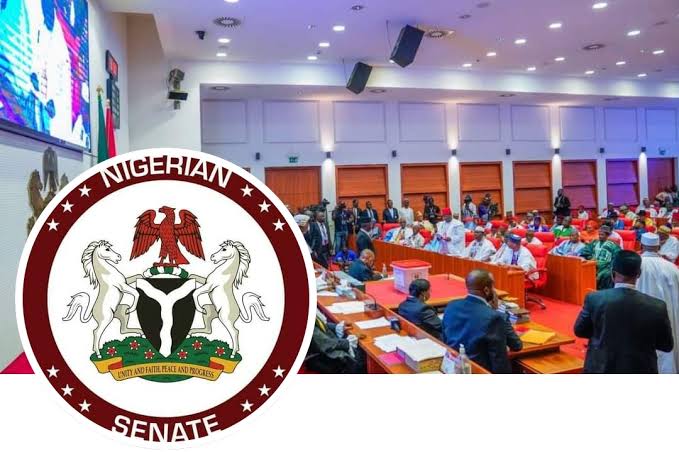Without a dissenting voice, the Senate on Thursday passed the controversial bill seeking to extend the retirement age of the members of staff of the National Assembly outside the statutory 60 years.
Thursday’s unanimous decision was a U-turn from the scenario last week when senators disagreed over the bill, which was first passed by the House of Representatives and forwarded to the Senate for concurrence.
Recall that on Thursday last week, the President of the Senate, Senator Godswill Akpabio, opted to step the bill down when senators began to disagree over its provisions.
However, one week later, senators were now on the same page, approving the passage of the bill.
The proposed legislation, with the short title, “A Bill for an Act to Make Provisions for the Retirement Age of National Assembly Service and for other Related Matters 2024”, seeks to extend the retirement age of a Legislative Staff from 60 years to 65 years and the length of service from 35 years to 40 years.
Senate Majority Leader, Senator Bamidele Opeyemi, while giving the synopsis of the bill earlier last week, described the legislature as a “specialised” institution, which needed to retain experienced hands to deepen legislative skills, training as well as grow institutional memory.
He also said the global standard was that legislative officers had a retirement age different from the regular civil service structure.
Opeyemi cited the cases of the United Kingdom and the United States of America to buttress his argument, adding that the National Assembly had previously done a similar retirement extension for teachers, university lecturers and judicial officers in the country.
The leader also told the Senate that the bill would help to address the problem of high turnover of legislative officers at the National Assembly, which had forced the management to resort to hiring consultants at very huge costs to provide technical support for parliamentary duties.
However, he said the bill excluded lower cadre workers like drivers, cleaners, security guards, typists, stewards, gardeners, among others.
But, there were dissenting voices last week. The first was Senator Enyinnaya Abaribe (Abia State), who told the Senate that it would be discriminatory to separate the National Assembly from the rest of the civil service by giving its senior employees a separate retirement age.
He recalled that the reason the National Assembly extended the retirement age of teachers and university lecturers was because of the recognition given to them as “the bedrock for developing the society.”
Abaribe added, “Every director or clerk has a deputy, and they (deputies) too want to go up. Why do we want people to stay here beyond the public service rule on retirement?
“Why not go ahead and pass a harmonised bill for the civil service in this country? I do not see what separates the person who works in the National Assembly from the person who works in a ministry outside the legislature.”
Senate Majority Whip, Senator Ali Ndume, cautioned his colleagues against taking a hasty decision in passing the bill.
“We are senators, let’s be careful. I will suggest that we step down this bill and do more consultations before we take a decision”, Ndume said.
Senator Dandutse Muntari from Katsina State sounded furious as he spoke, saying that the reasons offered to justify the bill were not satisfactory.
“We have graduates and unemployed youths outside, who should replace those who have reached retirement age.
“As a matter of fact, we are making things difficult for this country. Someone has spent 35 years in service, let him go”, he had stated.
Gauging the mood of the Senate as more senators raised their hands to oppose the bill, Akpabio asked that the bill be stood down.
He observed, “There is disagreement. This is a controversial bill. Let’s step it down for more consultations.”
But, on Thursday, the opposition to the bill died down, giving the presiding Deputy President of the Senate, Senator Barau Jibrin, the freedom to ram his gavel, passing the bill.
The bill will now await the signature of President Bola Tinubu to become law, effectively extending the tenure of all legislative officers due to retire this year by five years, depending on whether age or length of service comes first.
Background
Tribune Online observes that the retirement extension bill has always generated tension at the National Assembly over the years, usually coming up when the tenure of a serving Clerk to the Legislature is about to expire.
Between the 8th Assembly (2015-2019) and the 9th Assembly (2019-2023), the controversial bill generated heat as well when the then Clerk, Alhaji Mohammed Sani-Omolori, and many top officers due for retirement, pushed for the passage of the bill.
Following the intervention of the National Assembly Service Commission, which went ahead to nominate Architect Amos Olatunde-Ojo as Sani-Omolori’s successor, the matter was rested.
But, it was again re-awakened when close to the end of the tenure of Olatunde-Ojo, another succession battle started between him and the current clerk, Alhaji Magaji Tambuwal, before the former eventually exited the service.
With some months to Tambuwal’s exit from service, the bill has again resurfaced.
